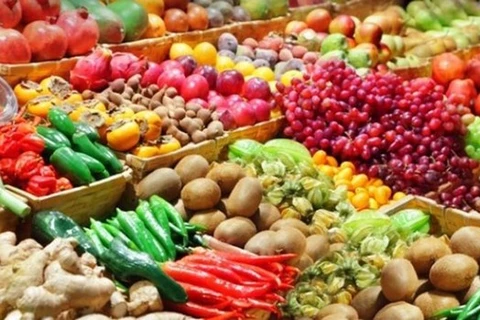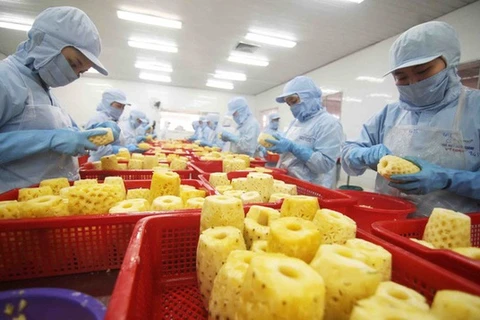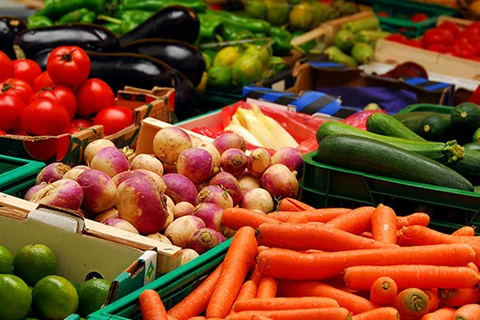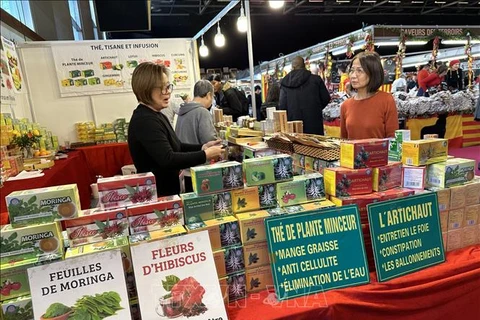HCM City (VNS/VNA) - The Middle East and North Africa have high demand for fruits and vegetables, offering Vietnamese firms a great opportunity to boost exports, according to the Ministry of Industry and Trade.
Nguyen Minh Phuong, director of the ministry’s Asia-Africa market department, said the Middle East, which comprises 15 countries and has a population of around 400 million people, has a high per capita income.
They import large volumes of agricultural products, including fruits and vegetables, she said.
Africa too has huge demand for agricultural products, but because of the distances, Vietnamese firms only export to countries in the north of the continent, she said.
Vietnam’s exports of fruits and vegetables to the Middle East and North Africa (MENA) have soared from 255.1 million USD in 2019 to 380.3 million USD in 2021, with the main markets being Turkey, the UAE, Egypt, Saudi Arabia, Israel, Iraq, Qatar, Morocco, and Algeria, she said.
But the exports account for only 2.6% of the region’s total imports in 2021, she said.
Of the exports to MENA, cashew is the largest item, rising from 167.8 million USD worth in 2019 to 260.8 million USD in 2021 and accounting for 50.2% of its total imports, she said.
“Vietnamese cashew products are available in many supermarkets in the UAE, Turkey, Saudi Arabia, Israel, and Egypt, and companies should continue to promote exports to the region,” she said.
Vietnam also exports coconut products (mature coconut, copra and coconut oil), lemon, almond, macadamia, banana, grapefruit, guava, mango, mangosteen, watermelon, lychee, rambutan, plum, carrot, and radish to the region.
But because of the distance, it is not easy to export fresh fruits, and so Phuong suggested exporting frozen fresh fruits instead.
She said there are challenges in exporting to Africa and the Middle East, including fierce competition from India, Iran, Turkey, Thailand, the Philippines, China, the US, European countries, and South Africa.
To be successful, Vietnamese firms should understand the regulations in each market, including food hygiene and safety and pesticide residue requirements, and labelling in local languages, she said.
Halal certification is required to export to the Middle East, home to a large Muslim population, while products exported to Israel must have Kosher certification, she said.
LuLu, the leading supermarket chain in the UAE, is present in Vietnam and imports many products, and Vietnamese businesses should touch base with it to export their products to the Middle East, she said.
They should also join the ministry’s trade promotion programmes to promote their products in the region, she added.
Dang Phuc Nguyen, general secretary of the Vietnam Fruit and Vegetables Association, said fruit and vegetable exports are expected to rise to 4 billion USD this year from 3.4 billion USD last year as many markets are allowing in Vietnamese fruits and China has reopened its borders.
Durian shipments alone fetched over 420 million USD last year after getting the green light to enter China through the official channel, and this year the figure is expected to top 1 billion USD, he said.
In the first two months of this year fruit and vegetable exports were worth 592 million USD, a 17.8% increase year-on-year.
China remained the major market, accounting for 57.5% of the exports./.
Nguyen Minh Phuong, director of the ministry’s Asia-Africa market department, said the Middle East, which comprises 15 countries and has a population of around 400 million people, has a high per capita income.
They import large volumes of agricultural products, including fruits and vegetables, she said.
Africa too has huge demand for agricultural products, but because of the distances, Vietnamese firms only export to countries in the north of the continent, she said.
Vietnam’s exports of fruits and vegetables to the Middle East and North Africa (MENA) have soared from 255.1 million USD in 2019 to 380.3 million USD in 2021, with the main markets being Turkey, the UAE, Egypt, Saudi Arabia, Israel, Iraq, Qatar, Morocco, and Algeria, she said.
But the exports account for only 2.6% of the region’s total imports in 2021, she said.
Of the exports to MENA, cashew is the largest item, rising from 167.8 million USD worth in 2019 to 260.8 million USD in 2021 and accounting for 50.2% of its total imports, she said.
“Vietnamese cashew products are available in many supermarkets in the UAE, Turkey, Saudi Arabia, Israel, and Egypt, and companies should continue to promote exports to the region,” she said.
Vietnam also exports coconut products (mature coconut, copra and coconut oil), lemon, almond, macadamia, banana, grapefruit, guava, mango, mangosteen, watermelon, lychee, rambutan, plum, carrot, and radish to the region.
But because of the distance, it is not easy to export fresh fruits, and so Phuong suggested exporting frozen fresh fruits instead.
She said there are challenges in exporting to Africa and the Middle East, including fierce competition from India, Iran, Turkey, Thailand, the Philippines, China, the US, European countries, and South Africa.
To be successful, Vietnamese firms should understand the regulations in each market, including food hygiene and safety and pesticide residue requirements, and labelling in local languages, she said.
Halal certification is required to export to the Middle East, home to a large Muslim population, while products exported to Israel must have Kosher certification, she said.
LuLu, the leading supermarket chain in the UAE, is present in Vietnam and imports many products, and Vietnamese businesses should touch base with it to export their products to the Middle East, she said.
They should also join the ministry’s trade promotion programmes to promote their products in the region, she added.
Dang Phuc Nguyen, general secretary of the Vietnam Fruit and Vegetables Association, said fruit and vegetable exports are expected to rise to 4 billion USD this year from 3.4 billion USD last year as many markets are allowing in Vietnamese fruits and China has reopened its borders.
Durian shipments alone fetched over 420 million USD last year after getting the green light to enter China through the official channel, and this year the figure is expected to top 1 billion USD, he said.
In the first two months of this year fruit and vegetable exports were worth 592 million USD, a 17.8% increase year-on-year.
China remained the major market, accounting for 57.5% of the exports./.
VNA

























